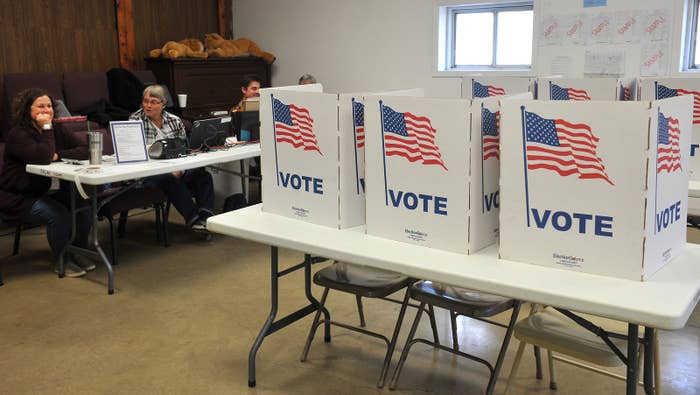
Twenty-one Democrats are running for president, but only a handful will be able to afford the hundreds of thousands of dollars it costs to access critical voter databases in the four states that kick off the primary.
To purchase the voter file in Iowa, the first caucus state, it’ll cost you $120,000. To buy it in New Hampshire, the first primary state in the nation: $100,000. And in the pair of key early-voting states that follow, Nevada and South Carolina, it’s another $100,000 — each. For voter file data covering the rest of the country, compiled by the Democratic National Committee in its own national voter file, campaigns must agree to a strict set of terms requiring candidates to raise money for the party in emails, videos, and at events — on top of a $175,000 price tag.
These voter files contain pools of data about millions of voters and potential volunteers. For campaigns, they’re a foundation for identifying and tracking voter support — which is crucial for day-to-day activities, ranging from field organizing to analytics and modeling.
The prices, independently confirmed by two campaign operatives with direct knowledge of the DNC and state party terms, are one piece of lengthy voter file agreements that also allow the DNC and the four early-state parties to keep some of a campaign’s data at the end of the race, according to multiple operatives and a copy of the DNC terms.
The state parties in Iowa, New Hampshire, Nevada, and South Carolina did not reply to requests for comment sent Tuesday. The DNC declined to comment for this story.
Unlike the Republican Party, which gives presidential campaigns access to its voter file data at no cost, Democrats in 2020 are looking at paying nearly $600,000 for their own — prompting multiple candidates to look to third-party voter data companies to provide similar information at a lower cost.
Anyone, of course, can run for president — and a record number of candidates who could qualify for the Democratic debates this summer, from tech mogul Andrew Yang and new-age guru Marianne Williamson to seven US senators, have jumped at the chance to run in an anyone’s-guess contest to take on President Donald Trump.
But the voter file costs pose a real if not often discussed barrier to entry: In the nine months before voting begins in Iowa, there will be candidates who may be polling competitively, but cannot afford the voter file in all four of the early-voting states, let alone the $175,000 cost of the DNC file.
And for the DNC and state parties that hold an outsize role in the primary process, voter data has become a fundraising mechanism.
Multiple campaigns have considered buying or have plans to buy data from private firms such as L2 and Political Data Inc., also known as PDI, that provide it for a fraction of the cost.
Those third-party companies don’t have access to the same data, or the same quality of data, as the DNC or the state parties, particularly in caucus states like Iowa and Nevada, which control unique caucus attendance records not available elsewhere.
Executives at the firms also spell out what 2020 aides only suggest in private: that campaigns, they say, feel a tacit pressure to support politically important state parties.
“We’ve had campaigns say, ‘We have to,’” said Paul Westcott, a senior vice president at L2, a leading provider of voter data that charges $30,000 for a database covering the first four states in the primary calendar.
“It’s ‘Get on board. Do you want the support of the party or not?’ When you're fundraising for the state party, there's an incentive to do it. You have to kiss the ring,” Westcott said in an interview. “And it blows my mind given how much money it is.”
L2 executives estimate that they’ve been in touch with eight Democratic campaigns that have “cited price” as their reason for looking to a private firm. L2 provides voter data nationwide — including from the first four states — for about $150,000 to $200,000.
At PDI, which is the main provider of voter data and software for Democrats and Republicans in California, vice president Paul Mitchell said multiple 2020 campaigns are in talks with the firm to use its database in the primary. California holds a key Super Tuesday slot March 3 and will help decide the nominee.
PDI charges about $45,000 for its California voter file and counts the Democratic state party and statewide campaigns among its clients.
“At least in the first four states, this is the dance,” he said, describing a Democratic data culture driven by fundraising and politics. “In California, we have a culture of setting really high expectations for data, and we meet them. What happens nationally around data is kind of foreign to party leaders, consultants, and campaigns that came up in California’s voter data culture."
The Republican Party has a different model, in part because it can afford to do so.
“They have a larger, richer donor base,” said a veteran Democratic operative who works in data. “I’m sure people on our side would love to have enough resources to do that.”
In 2016, during a primary that drew a field of 17 candidates, the Republican National Committee provided access to data infrastructure, which it values at $250 million, to any campaign that agreed to share its own data with the party and support the eventual GOP nominee.
“We believe in providing our candidates with top-notch data free of charge,” said RNC spokesperson Michael Ahrens.
“It benefits the entire party.”
